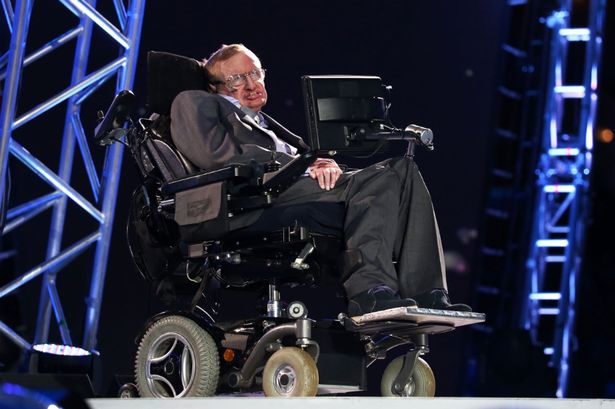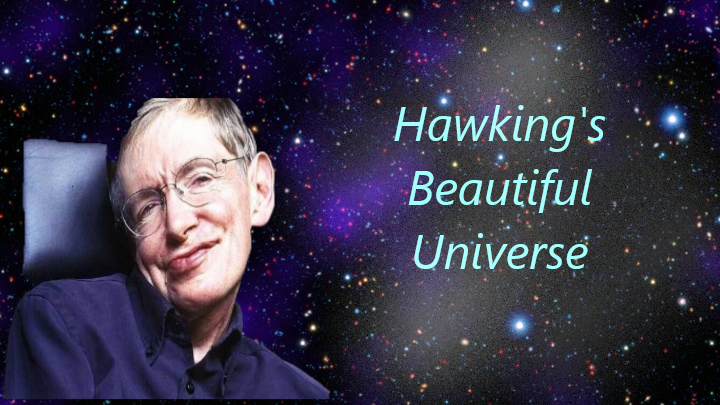Do we need to introduce this name?
Stephen William Hawking was an English theoretical physicist, cosmologist, author, and Director of Research at the Centre for Theoretical Cosmology within the University of Cambridge. His central exploration was in the areas of theoretical cosmology, focusing on the evolution of the Universe, governed by the laws of general relativity. He is best known for his work on black holes. With the theoretical prediction that black holes emit radiation, a theory called ‘Hawking radiation,’ he became the first to set forth a cosmology explained by a union of the general theory of relativity and quantum mechanics.
Hawking suffered from a rare and life-threatening condition of Amyotrophic Lateral Sclerosis, a disease he suffered all of his adult life. The illness started when he was 21 and pursuing his Ph.D. at Cambridge University. For a significant part of his later life, he was almost completely paralyzed and communicated through a speech-generating device. Not succumbing to the despair of the disease, Hawking devoted all his life to his work and research. He was the Lucasian Professor of Mathematics at the University of Cambridge for around three decades and an Honorary Fellow of the Royal Society of Arts. For his contribution to his pioneering work in cosmology, he made Commander of the Order of the British Empire.

Hawking became a member of the Institute of Astronomy at Cambridge in 1968, and the discoveries of cosmologist Roger Penrose on Black Hole really fascinated him. He started research on the origin of the Universe.
In 1970, Hawking discovered the ‘Second Law of Black Hole Dynamics,’ which states that the event horizon of a black hole can never get smaller. Along with James M. Bardeen and Brandon Carter, he proposed the four laws of ‘Black Hole Mechanics.’
Hawking visited Moscow in 1973, and his discussions with Yakov Borisovich Zel and Alexei Starobinsky helped him to come up with ‘Hawking Radiation.’ The following year, he became a ‘Fellow of the Royal Society.’
He started to get more recognition for his research and discoveries through his print and TV interviews. In 1975, he was awarded the Eddington Medal and the Pius XI Gold Medal, followed by the Dannie Heineman Prize and the Maxwell Prize.
Hawking was then appointed as a professor with a chair in gravitational physics in 1977 and received the ‘Albert Einstein Medal’ and an honorary doctorate from the University of Oxford. He gradually started losing control over his speech, and it became increasingly difficult to understand him but that this did not stop him from getting appointed as the Lucasian Professor of Mathematics at Cambridge University in 1979.
In 1982, Hawking and Gary Gibbons organized a Nuffield Workshop on the topic ‘The Very Early Universe’ at Cambridge University, which focused principally on the cosmological inflation theory. He published a model, the ‘Hartle-Hawking state’ with Jim Hartle, which stated that before the Big Bang, time did not exist, and the concept of the beginning of the Universe is meaningless.

In 1985, he lost his voice after a tracheotomy. As a result of this, he required 24-hour care. His condition caught the attention of a Californian computer programmer who invented a speaking program that could be directed by the head or eye movement.
Hawking gained international prominence for the first time in 1988 with the publication of ‘A Brief History of Time.’ It was meant to be a simplified version of cosmology for the masses and became an instant bestseller.
In 1993, he co-edited a book on Euclidean quantum gravity with Gary Gibbons. A famous collection of essays, interviews, and talk titled ‘Black Holes and Baby Universes and Other Essays’ was published in 1993. It was followed by a six-part television series, ‘Stephen Hawking’s Universe’ and a companion book.
He wrote a bunch of cosmology books that include, The Universe in Nutshell (2001), followed by, A Briefer History of Time (2005), God Created the Integers (2006), God’s Secret Key to the Universe (2007), The Grand Design (2010) and others.

He made a constant appearance on television during this period, in documentaries like—‘The Real Stephen Hawking (2001)’, ‘Stephen Hawking: Profile (2002)’, ‘Hawking (2004)’, ‘Stephen Hawking, Master of the Universe (2008)’, etc.
Hawking retired as Lucasian Professor of Mathematics in 2009, owing to University rules and regulations. He continued to work as a director of research at the Department of Applied Mathematics and Theoretical Physics.
Hawking became a ‘Commander of the Order of the British Empire’ in 1982. He was later honored with many prestigious awards like ‘the Gold Medal of the Royal Astronomical Society,’ ‘the Paul Dirac Medal,’ etc.
Other notable honors bestowed upon Hawking include ‘the Wolf Prize,’ ‘Companion of Honor by Her Highness,’ ‘Julius Edgar Lilienfeld Prize,’ ‘the Copley Medal,’ ‘the Presidential Medal of Freedom,’ ‘the Russian Fundamental Physics Prize.
Hawking’s physical condition increasingly began to deteriorate. He could no longer drive his wheelchair; he required a ventilator at times and was hospitalized several times since 2009. He was closely working with researchers on systems that could translate his brain patterns into switch activations.
Stephen Hawking died peacefully at his home in Cambridge, England, on March 14, 2018, at the age of 76.
Similar posts: Remembering Dr. Abdus Salam

Aniqa Mazhar is a graduate of QAU in Biochemistry. She has taught sciences to O levels and is currently planning for her MS in Food Technology. Aniqa’s hobbies are reading, watching movies, writing, calligraphy, long walks, and nature photography.

